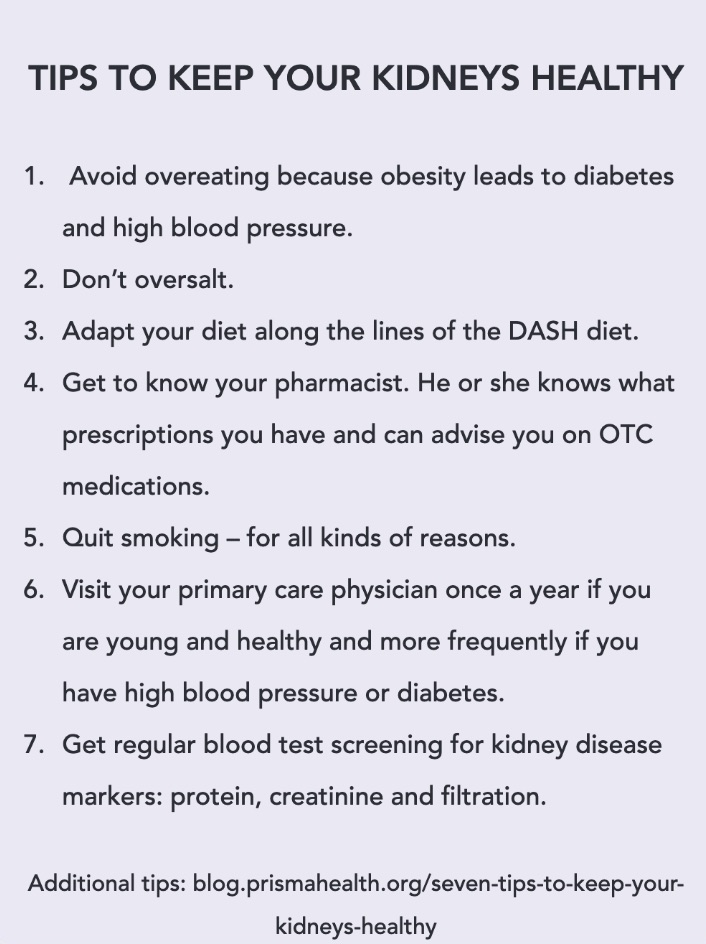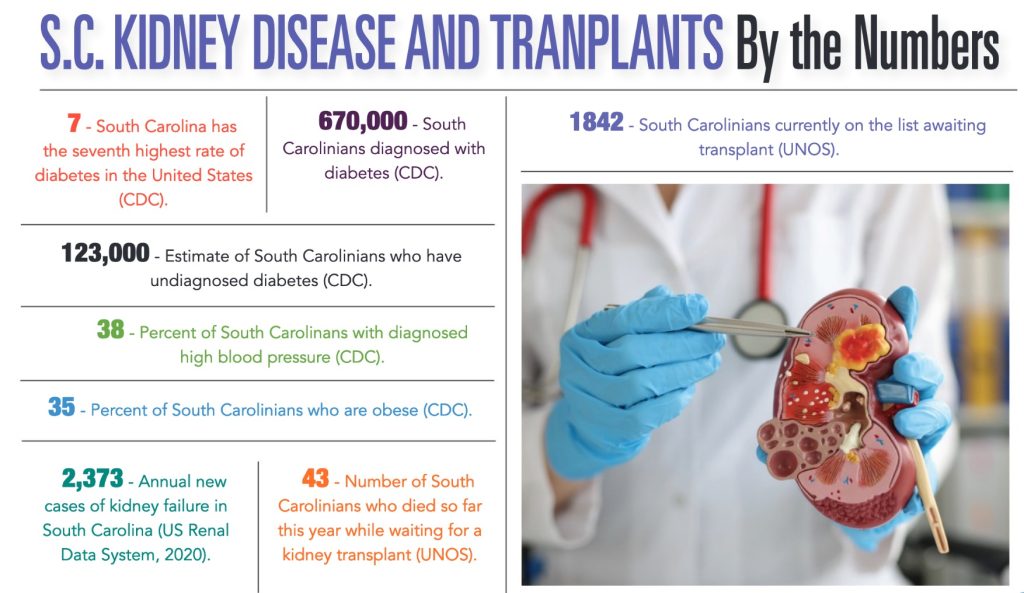(Editor’s Note: This story is the third in a three-part series of articles on kidney transplants, kidney health and disease prevention. In her early 50s, the writer learned that she had only one functional kidney; she was also diagnosed with kidney disease that was the result of overuse of over the counter ibuprofen. She had no idea. Read part 1 and part 2 in this series.)
When you go for a run, you think about your heart rate. If you struggle to catch your breath, you are aware of your lungs. And if you’re older and just can’t remember the name of that actor in that movie you loved, you may worry about your brain.
But how often do you think about your kidneys?
Kidneys are the body’s workhorse – cleaning out toxins, removing waste and balancing your bodily fluids. Until something pops up on a blood test or urinalysis, most of us have no idea if our kidneys are working properly or – and this is important – if we actually have two normal kidneys.
By the time that blood test shows something measurable, some damage may already be done.
For those reasons, Sarah Boyt, registered dietitian at the Prisma Health transplant center in Greenville, calls kidney disease a “silent disease.”
Because your kidneys process the vast majority of what you put into your body, it is important to be mindful about your health and what you eat, what prescription and over the counter medications and supplements you take.
“A healthy diet for our kidneys looks the same as a healthy diet for the heart, brain and the rest of the body,” Boyt explained. “It’s actually pretty simple.”
Low sodium, whole grains, lean proteins, fruits and vegetables, nuts, seeds and olive oil are the key components of the DASH diet, which is recommended by most clinicians. DASH is an acronym that stands for dietary approaches to stop hypertension.
Protein is a food fad today, and it’s not just chicken or fish. Protein bars and shakes and high-protein diets are adding potentially excessive amounts of protein into your body. And that, according to Boyt, can actually lead to kidney damage.
Regardless of medical imperatives, everyone should be controlling their salt consumption. The average daily intake should be 2,300 mg, according to Boyt. That’s about one teaspoon a day, including salt that is in all the processed foods that we cook at home or in fast food or restaurants meals.
A major job for the kidneys is processing medication and removing toxins from your body. Dr. Keith Superdock, chief nephrologist and co-director of the transplant center, noted that in order to be sold over the counter, medications must have been proven to be “relatively safe.” But that safety depends on the presumption that you take them only as directed and that you don’t have any medical condition that could cause the OTC medication to be harmful.
Dr. Superdock admitted that, like most of us, he doesn’t know for sure that he has two functioning kidneys. Like most of us, absent some lab result or diagnostic need for an ultrasound or CT scan, you really don’t know. According to the American Kidney Fund, 90% of people with early kidney disease don’t know they have it.
Your kidneys can be damaged – in some cases severely – by the presumed-safe OTC medications and supplements. Ibuprofen like Motrin, Aleve and Advil, can damage your kidneys if they are overused and should be avoided if you have any known kidney problems. Acetaminophen, like Tylenol, can damage your liver as well.
Dr. Superdock points to the risks of decongestants like pseudoephedrine or ephedrine, which “actually constrict arteries and can raise your blood pressure.”

But there is an even greater risk lurking in your local pharmacy: supplements. The claims of their makers are “not substantiated in science” to improve kidney function or address other ailments. Because the multibillion-dollar supplement industry has managed to stay “outside of the FDA’s jurisdiction,” it’s difficult for medical staff to “counsel someone when you’re not even sure what’s in the supplement they’re taking.”
Because the industry doesn’t have to abide by regulations about disclosing active and inactive ingredients or consistency in dosing, “they can get away with quite a few things.”
Dr. Superdock has seen cases of acute kidney failure stemming from taking what he described as “health-food-store supplements.” He’s also seen situations where supplements interacted negatively with prescribed medications for transplant patients, risking kidney rejection. And he saw a patient die from liver failure after taking pine bark extract – which is marketed as an antioxidant, a treatment for erectile dysfunction, a boost for your brain and an anti-inflammatory.
During COVID, millions of people opted to take ivermectin rather than get a vaccination.
This distrust of the medical industry is a challenge for clinicians like Dr. Superdock and Boyt.
“I hope that people start taking less advice from online groups and more advice from the doctors who see them on a regular basis and know their personal health histories,” said Dr. Superdock. “What might work for one person could be disastrous for another.”
Additional information: DASH diet: insider.com/guides/health/diet-nutrition/dash-diet
The American Kidney Fund: kidneyfund.org/sites/default/files/media/documents/South-Carolina-April-2021.pdf
By Laura Haight








